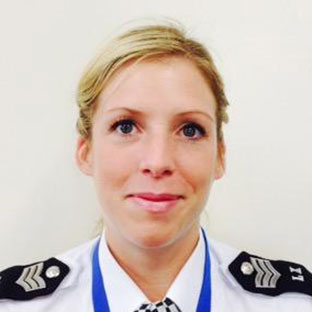Sergeant Caroline Hay, a local neighbourhood officer in south London, reflects upon the Royal Society of Arts report “Safer Together - Policing a global city in 2020”
A methodology for prioritisation - a risk assessment based on the severity of the crime, risk of further danger to people and property and likelihood of apprehension of the perpetrator.
Safer Together: Policing a global city in 2020
Prioritisation has and will always be used by police officers, this is our strength: Common Sense.
Every police officer can recount a story like this... It's what we do everyday.
I was working in Camden. I received a call from the local hospital to a woman who had been assaulted. This is a call that is “prioritised” although typical. However, when I arrived - even after 10 years service - I was shocked by what I saw.
This lady had two blackened eyes that were starting to cover over; her eye balls were barely visible. She had deep cuts to her head, dried blood all through her hair. Swollen limbs. Purple and blue patches had already started to develop across her body. She had taken a real beating.
So I ask: “What happened my lovely?”
I wanted her to know immediately that I wasn't a robot in a uniform; that this wasn't the 15th call of the day for me; I wasn't starving; I was now going to be finishing late; or I had my child to pick up.
None of this mattered.
I was someone who cared. She was my priority. This is why I joined ‘The Job.’
After a few cups of tea and 20 repetitions of 'nothing happened officer' the victim finally starts to talk.
So I take notes... And the investigation begins. I'll keep it brief but these are the basics:
- I arranged for a Detective from the community safety unit to come to the hospital to continue with a full statement.
- I stay to ensure the victim feels supported and doesn't shut down.
- I get two officers to collect her clothing, photos, swabs - and remain there in case suspect attends the hospital.
- Scenes of Crime Officer to attend to get more accurate photos.
- Two officers are allocated to the crime scene at the house - he has keys, he could show up there, he flashes 'violence towards police.'
- At least two officers on arrest enquiries to locate the outstanding suspects.
- An officer is tasked to arrange safe locations for her children.
- Officers conduct previous history, risk assessments.
The list of resources and actions goes on and on - and it’s only the beginning.
This female had called police and services numerous times, due to her alcohol and drug addiction. She is known as a 'regular caller.'
None of this mattered.
What matters is that we: prevent this happening again; gain evidence to prosecute and convict the offender; keep this lady and everyone else safe; respond without prejudice and judgment and have the resources to initiate all of the above.
This sort of work is completed by police day in, day out. And yes - that person may go back to the suspect. Even after a successful prosecution. However (and more importantly) some will break free from their persecutor. And that is what we always keep in our minds.
So - a theft of a bicycle, a burglary at home, people drinking on the streets. Does this now seem trivial?
Where does that lie on the list of priorities?
Well, in my view, very high. I will never belittle any crime. For each of these crimes have victims, and potentially, for each of these victims, this could be a life-changing event.
It could be the first and last time they have needed police. They may have paid their taxes all their lives and never needed to utilise a public service. And yet when they felt they needed police, they are turned away because they are not vulnerable, they have made good life choices, worked hard. It hardly seems fair that they should be penalised and not receive a service or feel they can rely on police...
Prioritising is a very sensitive issue.
As a neighbourhood officer, through interactive surveys, panel meetings and listening to the public, I know that every day Londoners may not be victims of domestic abuse or sexual assaults, but a high proportion will be a victim of a theft, burglary, criminal damage, collision - be upset or intimidated by youths, feel angered by their neighbours causing constant noise issues, drug dealers lurking on their street corners.
This is what upsets the people on my ward and on every ward across London.
Where will we be in 2020? I know one thing for sure, police officers will still be the first and last point of call. We will still go that extra mile, we will still police with professionalism, courage, compassion and integrity.
But hopefully we will police with more resources and support from our partnering agencies.
Read our report: 'Safer Together - policing a global city in 2020'
Sergeant Hay is on Twitter @MPSLarkhallSgt
Related articles
-
Blog: Can we ensure that civic energy and social justice go together?
Anthony Painter
Anthony Painter considers what it will take for us to combine civic energy and social justice as the drive towards devolution gathers pace.
-
Blog: Safer Together - Policing, Public Services and Austerity
Martin Davis FRSA
Martin Davis FRSA gives his verdict on our recent report Safer Together.
-
Blog: Safer together - Martin Hewitt on Policing a global city in 2020
Martin Hewitt
Martin Hewitt discusses the findings of the RSA report: Safer together: Policing a global city in 2020, and reflects on how the Met may have to a fundamentally different approach.



Be the first to write a comment
Comments
Please login to post a comment or reply
Don't have an account? Click here to register.